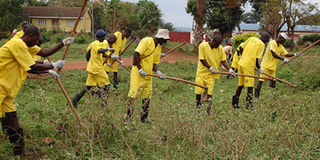Prisoners to get pay rise for labour

Jinja prisoners clear an area in Loco Village, one of the slum areas next to the shores of Lake Victoria in Jinja Central Division recently. FILE PHOTO
What you need to know:
- She observed that there is no particular training to prison staff to care for mental health despite the increasing convicts with mental disabilities which presents a risk to prisoners, partners and staff.
- PRI Africa Programme Manager, Ms Doreen Kyazze commended the initiative saying the payment is meant to support prisoners to meet their needs upon release.
KAMPALA. Arrangements have been finalized to increase payment for all prisoners providing labour to both private and government projects, senior officers have revealed.
According to the instrument signed by the Minister of Internal Affairs in 2000, skilled labour is paid Shs500 per day; semi-skilled labourers get Shs200 while the unskilled labour is Shs100.
Assistant Commissioner of Prisons Apolo Baker Asinja said that the payment for labour provided by inmates have been revised upwards basing on the bureau of statistic to suit the current living conditions.
“Prisoners’ remuneration is being revised up to 1000 and it was agreed and it is about to be approved by the relevant authorities. We had to seek for guidance on the rates to be in line with the current standards,” said Mr Asinja at the two day training workshop for northern region senior prison staff on management of vulnerable prisoners.
Without giving the specifics, Mr Asinja revealed that the lowest will be paid above Shs1000 per day in line with United Nations Standard Minimum rules on treatment of prisoners.
Rule 40 of the Standard Minimum rules on treatment of prisoners prohibits servitude, slavery or requiring prisoners to work for personal or private benefit of any prison staff.
The rule provides that any work should be useful for prisoner’s job prospects after release or be remunerated and take place in safe and legal conditions.
Rights organization, Penal Reform International (PRI) with partners organized the training aimed at creating awareness on the Standard Minimum rules on treatment of prisoners.
PRI Africa Programme Manager, Ms Doreen Kyazze commended the initiative saying the payment is meant to support prisoners to meet their needs upon release.
“This is another way of contributing to re-offending to support life after prison. The review will bring in tandem with the prevailing economic changes of life,” said Ms Kyazze adding that the pay rise is supplementary to the skills attained while serving their sentences.
She observed that there is no particular training to prison staff to care for mental health despite the increasing convicts with mental disabilities which presents a risk to prisoners, partners and staff.
“There is need for reform in regard to continued incarceration of prisoners with disabilities and without any certainty on when they would be transferred to appropriate institutions to get treatment. Many of them remain in prison on ministers’ order with indefinite sentences,” said Ms Kyazze citing a case of an old man who died in Fort Portal Prison after serving 20 years on minister’s order.
[email protected]




